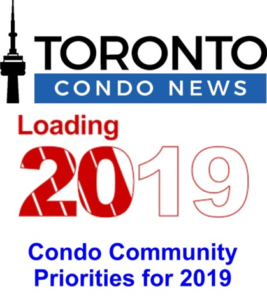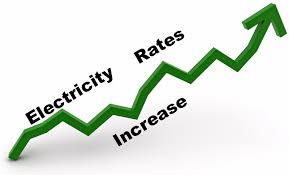 January 2019
January 2019
Another year behind us!
2018 will go down as the year cannabis, or marijuana, became legal in Canada. For Toronto’s condo communities, 2018 has been a year of transition. The residential real estate market stopped growing, by most estimates, and appears to have begun a decline. Interest rates and inflation are on the rise after years of decline. And an updated Condo Act has imposed new rules, procedures and expenses. These major events will affect Toronto’s condo communities for years to come.
For 2019 Toronto Condo News has identified its top priorities for the Toronto Condo Community in 2019.
- Smoking restrictions – Dealing with legalization of cannabis (marijuana)
- Rising interest rates – Impact on expenses, collections, resale prices and condo fees
- Rising electricity costs – How to pay these expenses or reduce them
- Drones – Privacy and operational matters
Twelve months ago we identified our top priorities for the Toronto Condo Community in 2018.
At the dawn of 2019 little has changed with two exceptions. There have been two elections during 2018 in which condo community concerns were irrelevant. Despite being a majority of the population, the condo community has chosen not to make their concerns a priority. As for the Condo Act, which took the top three spots in 2018, few condo residents ever hear about it or understand its impact on them. The Act remains a work in process, seemingly no longer a priority to complete for the current government. Condo fees are higher partially to support the Condominium Authority of Ontario (CAO), mandated as part of the Act, and largely ignored by much of the community. The Condo Authority Tribunal, a central part of the CAO, was deemed necessary to deal with disputes. It has reported on so few cases there is now doubt as to its need and value.

Expectations for 2019 are that Toronto’s condo communities will focus on concerns neglected or partially addressed over the past year.
 Smoking Restrictions
Smoking Restrictions
The majority of condo communities have failed to address smoking restrictions to accommodate legalization of cannabis in a permanent manner. Some will be forced to deal with, or will choose to ignore, the impact of individuals smoking cannabis in their suite while allowing smoke and odour to migrate to common areas or other suites. Legal disputes are expected in those communities which failed to update their declaration or by-laws prior to October 2018. Some may find they are required to undertake costly changes to prevent smoke and odour from migrating from suites in their building. Others may experience fires from careless smoking or discarding of butts.
This will be the year Toronto and GTA condo communities having failed to take proper measures in 2018 will begin to deal with any consequences that arise. Proactive boards made these changes in advance of legalization of cannabis. Many will likely follow in the coming years after spending more time and money resulting from an earlier failure to act.
Airlines and public transit have both learned it is best to prohibit smoking. Condo communities are likely to eventually follow this same path with smoking being limited to “poorer quality” buildings where nobody is paying attention.

Rising Interest Rates and Inflation
Condo expenses are expected to continue their rise through 2019. Higher interest rates and inflation are expected to result in an increase of all condo budget items. Condo owners, dealing with higher mortgage rates, are less likely to accept higher condo fees while trying to control their own personal expenditures without opposition and increased scrutiny.

Rising Electricity Costs
Energy expenses, typically the largest item in a condo budget, are expected to rise more dramatically in the coming years. The cost of energy is uncontrollable by any condo community. What each community can do is reduce overall use. They can do this by implementing energy efficiencies and educating building residents about how they can do the same.
- Upgrading older and inefficient equipment – lighting, boilers, building automation systems
- Repair or installation of outer doors
- Submetering to ensure building residents pay for what they use
- Replacement or enhancement of older windows to reduce energy loss
- Interior caulking of windows to reduce energy loss
Now is the time to commence energy reduction initiatives.
 Drones
Drones
Drones are remote controlled flyers which are becoming increasingly popular. With a mounted camera they can be used for taking pictures and video of a high-rise building to identify problems. They inadvertently “look” into the windows of high-rise condo buildings.
Drone flying undertaken by any individual or any purpose can result in invasion of privacy when pointed to a window or balcony.
As the use of drones increase there are likely to be more privacy complaints. Communities may want to incorporate rules or procedures for regulating, controlling and monitoring the use of drones on condo property. There may also be insurance considerations.
These four concerns of condo boards are likely to be at the top of many agendas for 2019.

Find Vendors in these Related Categories
- Accounting
- Air Quality
- Cleaning & Janitorial Services
- Cleaning Services - Ducts
- Energy Services
- Energy Services - Efficiency
- Energy Services - Electricity
- Energy Services - Gas
- Energy Services - Water
- Environmental Consulting
- Financial Services
- Financial Services - Investments
- Financial Services - Loans
- HVAC
- Lighting Services & Suppliers
- Odour Control



